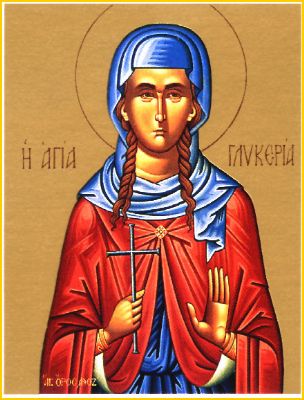|
|||
|---|---|---|---|
| This weekly bulletin insert complements the curriculum published by the Department of Christian Education of the Orthodox Church in America. This and many other Christian Education resources are available at http://dce.oca.org. | |||

The second-century virgin martyr Glyceria was born to a rich Roman family, but she faced poverty when her father died and the family money was lost. She had far more challenging experiences than losing wealth. Arrested for her faith by a pagan governor, Glyceria was imprisoned and left to starve. But the governor was in for a surprise, as the "Prologue from Ochrid" tells us: "After a certain time, when the governor reckoned that the maiden must have died of hunger, he opened the prison and was astounded to see her in good health, bright and merry" (Vol. II pg. 174). Glyceria further surprised the pagans around her by continuing to praise Christ openly. She was so devoted to God that when tortured with fire, she declared her grateful willingness to share the experience of the prophet Daniel in the fiery furnace. We read in Acts 8:40-9:19 about several other people who were also surprised by God. First up is the apostle Philip, who instructed the Ethiopian eunuch on the road to Gaza. After their meeting, the Spirit of the Lord "caught up Philip" and he "was found at Azotus." What a surprise it must have been to Philip to be taken from one place to another in that mysterious way. Yet he doesn't seem to have missed a beat. We read that he went right ahead with his work, and "passing on he preached the gospel to all the towns till he came to Caesarea." The next verses are about Saint Paul, still at this time called Saul, who was surprised on the road to Damascus by a lightning flash and a voice he had not heard before. Somehow, he knew to address the person speaking as "Lord." When he got back up on his feet, having been knocked to the ground by the encounter, he was further surprised to realize that he had (temporarily) lost his sight. Finally we read about Ananias, who was told by the Lord to go and find Saul. Ananias' reply to God indicates his surprise, and his reluctance. He "reminds" God that Saul had very recently been persecuting Ananias and other Christians. Saul was known to them as a man doubly to be feared because he had done much evil to them, and also because he had authority from the chief priests to do more.
Yet God tells Ananias that Saul is His "chosen instrument" and that this hater of Christians will soon be carrying His name "before the Gentiles and kings and the sons of Israel." So, despite his hesitant surprise, Ananias obeys God. In doing so he is blessed to play a central part in establishing Paul as the great missionary he will become. If we ever doubted it, these people we remember and read about should convince us that God often surprises us, doing things in His own way to accomplish His divine will. |
|||

